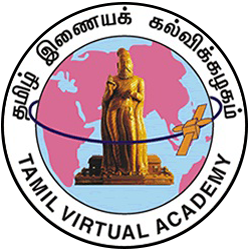Primary tabs
-
A02113 பெயர்ச்சொல்லின் பொது இலக்கணம்
Stating the general grammar of nouns this lesson presents the sixfold classification of nouns. They are according to the object (பொருட் பெயர்), place (இடப் பெயர்), time (காலப் பெயர்) organ (சினைப் பெயர்) characteristic (பண்புப் பெயர்) and work (தொழிற் பெயர்) referred to by the word.
Nouns can be conventional (இடுகுறிப் பெயர்) or causal (காரணப் பெயர்). They do not indicate time. They are inflected in eight different ways (வேற்றுமை) performing the functions of English prepositions.
When a finite verb (வினைமுற்று) assumes the function of a noun as in பாடியவன் it is called விணையாலணையும் பெயர் (verbal noun). It is of three types in accordance with the three positions of I, II, and III persons. In the expressions, எடுத்தனைப் பார்த்தாயா,
சென்றாயைக் கண்டேன் and படித்தவனுக்குப் பரிசு கிடைத்தது the first words are example of the three types.
Negative verbal nouns exist in Tamil as in ’பாடாதவர்.
When the name of an object refers to another object of long association with it is called ஆகுபெயர்.
There are two groups of ஆகு பெயர் based on what is referred to by the noun in the context where it is used. The first group comprises six kinds such as பொருள் (object), இடம் (Place), காலம் (time). சினை (organ). பண்பு (character) and தொழில் work.
In the other group are seven items such as measurement (அளவையாகு பெயர்), meaning (சொல்லாகு பெயர்), environment (தானியாகு பெயர்), instrument (கருவியாகு பெயர்), cause (காரியவாகு பெயர்), creation (கருத்தாகு பெயர்) and comparison (உவமையாகு பெயர்) Thus there are 13 types of ஆகு பெயர்.
In sum, this lesson enables you to classify and appropriately use different nouns in Tamil.


